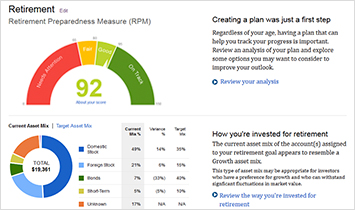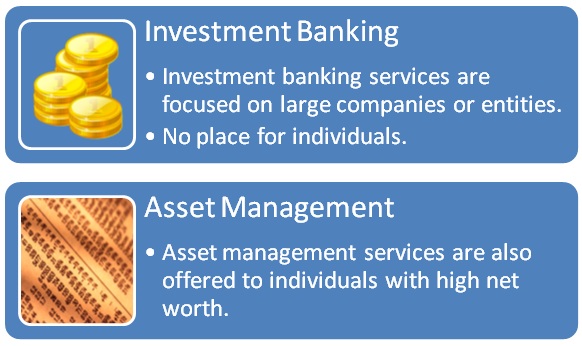
The management of investments involves investing capital in the appropriate combination of financial instruments. Based on the client's investment goals, risk preferences, and time horizon, the investment manager determines the level of risk that a client should take. They are also responsible to maintain an investment strategy for a specified period. They can draw upon a wide range of data sources in order to analyse market conditions and economic trends. Investment managers typically get compensated by charging fees depending on the capital they invest and the profits they generate. Investor managers might also be compensated through the sale of investment products.
Asset management companies manage money for individual investors and institutions. They provide services such as market timing, investment advisory, direct investments in real-estate, bonds, and other financial tools. Clients include pension plans and private investment companies, as well as hedge funds. Additionally, they design insurance products.

There are many investment management strategies that can be used, from passive to aggressive. Managers often recommend diversifying portfolios according to asset type and geographic location. This can reduce risk and help you get the highest return from volatile assets. Some managers might recommend diversifying according to strategy, such a global equity plan or a fixed income strategy. The manager will recommend aggressive or less risky investment strategies depending on the client's tolerance.
There are several types of investment managers, including money managers, asset managers, and portfolio managers. Each role is different. Money managers help the client to determine investment goals, develop an investment strategy, and monitor the performance of the portfolio. Asset managers use their knowledge of securities and economic trends to construct and manage portfolios. Investment managers use a variety of strategies, including asset allocation and Modern Portfolio Theory. They may also use a combination of strategies, such passive and active strategies, to help meet their clients' investment goals.
Institutional investors like pension funds, corporations, or endowments often hire investment managers. They can use their expertise to evaluate individual securities and determine their value. Their expertise is then used to develop and implement strategies for their clients. They may be paid fees based upon the asset value they manage.
Asset managers have vast amounts of capital to invest and have an extensive knowledge of the financial markets. They may invest in public securities, bond investments, mutual fund share, or other types of securities. They may also use derivatives, which are contracts that give investors high returns at low risk. Statistics may be used by investment managers to find inefficiently-priced assets. They might also collaborate with other managers to attain high performance.

Portfolio managers plan and execute investment strategies for clients. They pick securities and ETFs that are suitable for their clients' risk tolerance and investment timeframe. They analyze economic and market conditions using various data sources, including S&P 500 Index. Monte Carlo analysis allows investment managers to produce thousands of return projections. They then determine whether their financial goals will be met. They make decisions based primarily on the client's goals, and must also maintain their investment strategy.
FAQ
What is the best passive income source?
There are tons of ways to make money online. Many of these methods require more work and time than you might be able to spare. So how do you create an easy way for yourself to earn extra cash?
The solution is to find what you enjoy, blogging, writing or selling. You can then monetize your passion.
For example, let's say you enjoy creating blog posts. Start a blog where you share helpful information on topics related to your niche. Then, when readers click on links within those articles, sign them up for emails or follow you on social media sites.
Affiliate marketing is a term that can be used to describe it. There are many resources available to help you get started. For example, here's a list of 101 Affiliate Marketing Tools, Tips & Resources.
As another source of passive income, you might also consider starting your own blog. Again, you will need to find a topic which you love teaching. However, once your site is established, you can make it more profitable by offering ebooks, videos and courses.
There are many ways to make money online, but the best ones are usually the simplest. You can make money online by building websites and blogs that offer useful information.
After you have built your website, make sure to promote it on social media platforms like Facebook, Twitter and LinkedIn. This is known as content marketing and it's a great way to drive traffic back to your site.
What is the difference in passive income and active income?
Passive income is when you earn money without doing any work. Active income requires work and effort.
You create value for another person and earn active income. Earn money by providing a service or product to someone. For example, selling products online, writing an ebook, creating a website, advertising your business, etc.
Passive income allows you to be more productive while making money. Most people don't want to work for themselves. So they choose to invest time and energy into earning passive income.
Problem is, passive income won't last forever. If you hold off too long in generating passive income, you may run out of cash.
It is possible to burn out if your passive income efforts are too intense. So it's best to start now. If you wait until later to start building passive income, you'll probably miss out on opportunities to maximize your earnings potential.
There are three types to passive income streams.
-
Businesses - these include owning a franchise, starting a blog, becoming a freelancer, and renting out the property such as real estate
-
These investments include stocks and bonds as well as mutual funds and ETFs.
-
Real Estate - These include buying land, flipping houses and investing in real estate.
What are the top side hustles that will make you money in 2022
It is best to create value for others in order to make money. You will make money if you do this well.
It may seem strange, but your creations of value have been going on since the day you were born. Your mommy gave you life when you were a baby. You made your life easier by learning to walk.
You will always make more if your efforts are to be a positive influence on those around you. You'll actually get more if you give more.
Value creation is a powerful force that everyone uses every day without even knowing it. It doesn't matter if you're cooking dinner or driving your kids to school.
There are actually nearly 7 billion people living on Earth today. That means that each person is creating a staggering amount of value daily. Even if you create only $1 per hour of value, you would be creating $7,000,000 a year.
This means that you would earn $700,000.000 more a year if you could find ten different ways to add $100 each week to someone's lives. That's a huge increase in your earning potential than what you get from working full-time.
Now let's pretend you wanted that to be doubled. Let's suppose you find 20 ways to increase $200 each month in someone's life. You would not only be able to make $14.4 million more annually, but also you'd become very wealthy.
Every day, there are millions upon millions of opportunities to create wealth. This includes selling information, products and services.
Although our focus is often on income streams and careers, these are not the only things that matter. Ultimately, the real goal is to help others achieve theirs.
To get ahead, you must create value. My free guide, How To Create Value and Get Paid For It, will help you get started.
What side hustles make the most profit?
Side hustle is a term used to describe any side income streams that can supplement your main source.
Side hustles provide extra income for fun activities and bills.
Side hustles are a way to make more money, save time, and increase your earning power.
There are two types: active and passive side hustles. Passive side hustles include online businesses such as e-commerce stores, blogging, and freelancing. Some examples of active side hustles include dog walking, tutoring and selling items on eBay.
Side hustles that work for you are easy to manage and make sense. Consider starting a business in fitness if your passion is working out. Consider becoming a freelance landscaper, if you like spending time outdoors.
Side hustles can be found anywhere. Look for opportunities where you already spend time -- whether it's volunteering or taking classes.
One example is to open your own graphic design studio, if graphic design experience is something you have. You might also have writing skills, so why not start your own ghostwriting business?
Whatever side hustle you choose, be sure to do thorough research and planning ahead of time. You'll be ready to grab the opportunity when it presents itself.
Side hustles are not just about making money. Side hustles can be about creating wealth or freedom.
There are so many opportunities to make money that you don't have to give up, so why not get one?
How much debt can you take on?
It's essential to keep in mind that there is such a thing as too much money. If you spend more than you earn, you'll eventually run out of cash because it takes time for savings to grow. So when you find yourself running low on funds, make sure you cut back on spending.
But how much is too much? There's no right or wrong number, but it is recommended that you live within 10% of your income. This will ensure that you don't go bankrupt even after years of saving.
This means that even if you make $10,000 per year, you should not spend more then $1,000 each month. If you make $20,000 per year, you shouldn't spend more then $2,000 each month. Spend no more than $5,000 a month if you have $50,000.
Paying off your debts quickly is the key. This includes credit card bills, student loans, car payments, etc. When these are paid off you'll have money left to save.
It's best to think about whether you are going to invest any of the surplus income. You may lose your money if the stock markets fall. However, if you put your money into a savings account you can expect to see interest compound over time.
Consider, for example: $100 per week is a savings goal. That would amount to $500 over five years. You'd have $1,000 saved by the end of six year. In eight years, you'd have nearly $3,000 in the bank. You'd have close to $13,000 saved by the time you hit ten years.
In fifteen years you will have $40,000 saved in your savings. That's quite impressive. But if you had put the same amount into the stock market over the same time period, you would have earned interest. Instead of $40,000 in savings, you would have more than 57,000.
It's crucial to learn how you can manage your finances effectively. A poor financial management system can lead to you spending more than you intended.
How can a beginner earn passive income?
Begin with the basics. Once you have learned how to create value, then move on to finding ways to make more money.
You might even already have some ideas. If you do, great! If not, you should start to think about how you could add value to others and what you could do to make those thoughts a reality.
Finding a job that matches your interests and skills is the best way to make money online.
For instance, if you enjoy creating websites or apps, there are lots of ways that you can generate revenue even while you sleep.
If you are more interested in writing, reviewing products might be a good option. Or if you're creative, you might consider designing logos or artwork for clients.
Whatever topic you choose to focus on, ensure that it's something you enjoy. You'll be more likely to stick with it over the long-term.
Once you find a product/service you love helping people buy, it's time to figure out how you can monetize it.
You have two options. You could charge a flat rate (like a freelancer), or per project (like an agencies).
In either case, once you've set your rates, you'll need to promote them. It can be shared on social media or by emailing your contacts, posting flyers, and many other things.
These three tips will help you increase your chances for success when marketing your business.
-
You are a professional. When you work in marketing, act like one. You never know who could be reading and evaluating your content.
-
Know your subject matter before you speak. A fake expert is not a good idea.
-
Spam is not a good idea. You should avoid emailing anyone in your address list unless they have asked specifically for it. Send a recommendation directly to anyone who asks.
-
Use a good email provider - Gmail and Yahoo Mail are both free and easy to use.
-
Monitor your results. You can track who opens your messages, clicks links, or signs up for your mail lists.
-
Measure your ROI - measure the number of leads generated by each campaign, and see which campaigns bring in the most conversions.
-
Ask your family and friends for feedback.
-
Try different strategies - you may find that some work better than others.
-
You must continue learning and remain relevant in marketing.
Statistics
- According to a June 2022 NerdWallet survey conducted online by The Harris Poll. (nerdwallet.com)
- Etsy boasted about 96 million active buyers and grossed over $13.5 billion in merchandise sales in 2021, according to data from Statista. (nerdwallet.com)
- Mortgage rates hit 7.08%, Freddie Mac says Most Popular (marketwatch.com)
- 4 in 5 Americans (80%) say they put off financial decisions, and 35% of those delaying those decisions say it's because they feel overwhelmed at the thought of them. (nerdwallet.com)
- Shares of Six Flags Entertainment Corp. dove 4.7% in premarket trading Thursday, after the theme park operator reported third-quarter profit and r... (marketwatch.com)
External Links
How To
How to make money online
How to make money online today differs greatly from how people made money 10 years ago. You have to change the way you invest your money. There are many ways you can earn passive income. However, some require substantial upfront investment. Some methods are easier than others. However, there are many things you need to do before investing your hard-earned funds in anything online.
-
Find out what kind investor you are. If you're looking to make quick bucks, you might find yourself attracted to programs like PTC sites (Pay per click), where you get paid for simply clicking ads. However, if long-term earning potential is more important to you, you might consider affiliate marketing opportunities.
-
Do your research. Do your research before you sign up for any program. Check out past performance records and testimonials before you commit to any program. It is not worth wasting your time and effort only to find out that the product does not work.
-
Start small. Don't jump straight into one large project. Instead, you should start by building something small. This will help you learn the ropes and determine whether this type of business is right for you. After you feel confident enough, you can start working on larger projects.
-
Get started now! You don't have to wait too long to start making money online. Even if you've been working full-time for years, you still have plenty of time left to build a solid portfolio of profitable niche websites. All you need to get started is an idea and some hard work. Now is the time to get started!